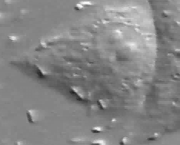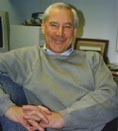He's been surprised at the results. "We've found that
the host cell is clearly not an innocent bystander," says Falkow. "It
actually participates by ushering in the bacteria."
For instance, in the early stages of a
Salmonella
infection, a single
bacterium enters a killer cell, called a phagocyte. Phagocytes are cells
in our immune system that destroy foreign invaders. Once inside, however,
the
Salmonella
tricks the phagocyte into reaching out with special
structures called ruffles and pulling more
Salmonella
bacteria in
from the outside. You almost have to admire the bacteria's
brash
approach: they go straight to the most dangerous cells in the immune system
and then, like tiny Trojan horses, get the cell to open up and pull them
in.
|
Once inside the phagocyte, the bacteria are enveloped in a
membrane-walled "room" called a vacuole. At this point, most invaders
are doomed: the phagocyte normally injects proteins into the vacuole to
dissolve the bacteria. Some
Salmonella
, however,
manage to
protect themselves by preventing the host cell from dispatching these toxins.
How they manage this is a mystery.
"If I knew the answer," says Falkow, "I could maybe get a
Nobel Prize."
|

Salmonella
trick the immune cell into reaching out and pulling
them inside. Video provided by Stanley Falkow. 2.4 Megabyte QuickTime Movie.
Click on the image to view.
|

|
Falkow continues: "We know a little bit. We certainly
know that something is happening genetically and biochemically in one compartment
and not another."
Eventually, the bacteria reproduce until they fill up the vacuole. Then
they subvert the host again by sending out a protein which sets off a chain
of biochemical reactions that eventually leads to the death of the host
cell.
|

Stanley Falkow, Professor of Microbiology and Immunology
at Stanford University Medical School and incoming president of the American
Society of Microbiology, began a lifelong fascination with bacteria when
he was 11 years old. He has devoted his academic career to understanding
the complex interactions between pathogenic microbes and their human hosts.
To complement the Exploratorium's current special exhibition, Hidden Kingdoms,
Professor Falkow sat down with writer Mary Miller and provided a rare peek
at how microbes invade our cells.

|

|
Stanley Falkow explains, "Why he likes bacteria
more than people"
|
The RealAudio clip that appears here is the first
of three that appear in this story.

|
|
|

